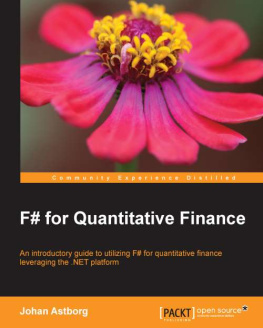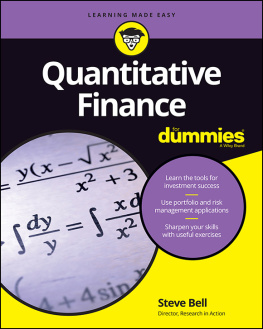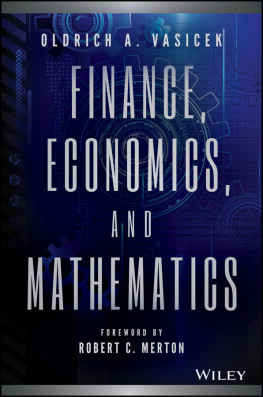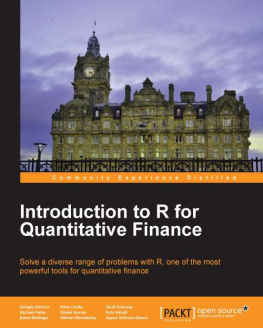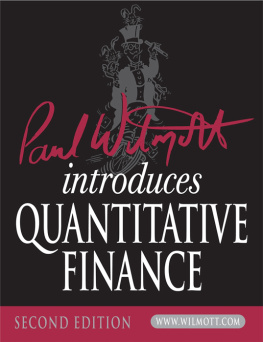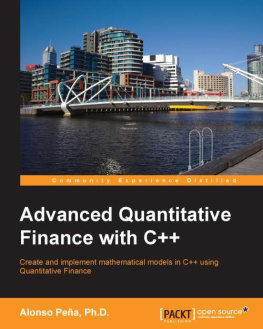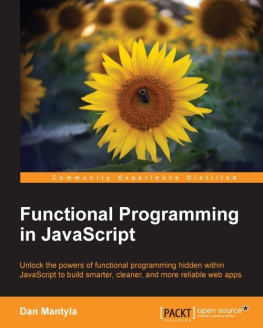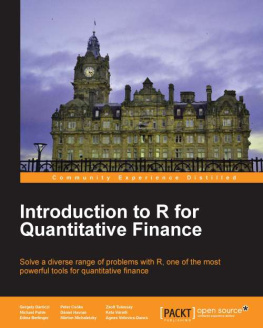Johan Astborg - F# for Quantitative Finance
Here you can read online Johan Astborg - F# for Quantitative Finance full text of the book (entire story) in english for free. Download pdf and epub, get meaning, cover and reviews about this ebook. year: 2013, publisher: Packt Publishing, genre: Computer. Description of the work, (preface) as well as reviews are available. Best literature library LitArk.com created for fans of good reading and offers a wide selection of genres:
Romance novel
Science fiction
Adventure
Detective
Science
History
Home and family
Prose
Art
Politics
Computer
Non-fiction
Religion
Business
Children
Humor
Choose a favorite category and find really read worthwhile books. Enjoy immersion in the world of imagination, feel the emotions of the characters or learn something new for yourself, make an fascinating discovery.
- Book:F# for Quantitative Finance
- Author:
- Publisher:Packt Publishing
- Genre:
- Year:2013
- Rating:3 / 5
- Favourites:Add to favourites
- Your mark:
F# for Quantitative Finance: summary, description and annotation
We offer to read an annotation, description, summary or preface (depends on what the author of the book "F# for Quantitative Finance" wrote himself). If you haven't found the necessary information about the book — write in the comments, we will try to find it.
An introductory guide to utilizing F# for quantitative finance leveraging the .NET platform
Overview
- Learn functional programming with an easy-to-follow combination of theory and tutorials
- Build a complete automated trading system with the help of code snippets
- Use F# Interactive to perform exploratory development
- Leverage the .NET platform and other existing tools from Microsoft using F#
In Detail
F# is a functional programming language that allows you to write simple code for complex problems. Currently, it is most commonly used in the financial sector. Quantitative finance makes heavy use of mathematics to model various parts of finance in the real world. If you are interested in using F# for your day-to-day work or research in quantitative finance, this book is a must-have.
This book will cover everything you need to know about using functional programming for quantitative finance. Using a functional programming language will enable you to concentrate more on the problem itself rather than implementation details. Tutorials and snippets are summarized into an automated trading system throughout the book.
This book will introduce you to F#, using Visual Studio, and provide examples with functional programming and finance combined. The book also covers topics such as downloading, visualizing and calculating statistics from data.
F# is a first class programming language for the financial domain.
What you will learn from this book
- Use Visual Studio as your main tool for writing F#
- Utilize F# to aggregate data and calculate statistics
- Plot and visualize data in F#
- Learn about volatility, delta hedging, and volatility arbitrage
- Understand basic numerical analysis and algorithm implementation
- Model orders and market data together with basic pre-trade risk
- Structure and write object-oriented code
- Develop larger programs using F#
- Explore automated trading systems and quantitative trading models
Approach
The approach is to guide you as a reader from the basics of functional programming and F# to more complex tasks using tutorials and a lot of code examples. As you gain more confidence through out the book, you will be able to modify and write your own code to solve various problems in finance.
Who this book is written for
If you are a practitioner of quantitative finance, economics, or mathematics and wish to learn F#, then this book is for you. You may have a basic conceptual understanding of financial concepts and models, but no previous knowledge is expected.
Johan Astborg: author's other books
Who wrote F# for Quantitative Finance? Find out the surname, the name of the author of the book and a list of all author's works by series.

